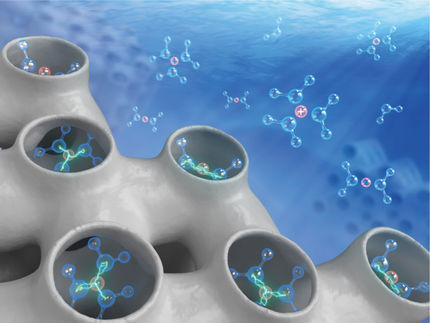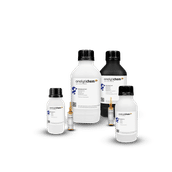Bio-inspired catalysts that work in water open door to greener chemical processes
Advertisement
Université Laval researchers have developed catalysts that, like enzymes present in living cells, are able to function efficiently in water. This discovery shows that it may be possible to substantially reduce the use of toxic and non-recyclable organic solvents in a host of chemical reactions, particularly when synthesizing pharmaceutical ingredients.
"The vast majority of chemically synthesized compounds are produced by reactions using organic solvents," explains Normand Voyer, professor at Université Laval's Faculty of Science and Engineering and the study's lead author. "These solvents are toxic and difficult to reuse, but the industry turns to them because very few reactions can take place efficiently in water. However, all cellular reactions occur in an aqueous medium, without such organic solvents. That's what gave us the idea to develop a biomimetic process inspired by enzymes, the natural catalysts found in cells."
The researchers' solution is based on polypeptides, short chains of a single amino acid that, due to their hydrophobic nature, act as a catalyst in reactions involving non-water-soluble reagents and chemicals. "The most effective catalyst we have tested so far is poly-L-leucine," explains Professor Voyer. "Our work has allowed us to identify the conditions needed to ensure the catalyst's optimal efficacy in a classic reaction commonly used in chemistry, the epoxidation reaction. We've had yields of over 95%, which compares favorably with those achieved using organic solvents."
The use of such biomimetic polypeptide catalysts is advantageous both from an ecological and economic standpoint because they are inexpensive, they do not generate toxic waste and are reusable. "Now we're trying to demonstrate that this approach is viable for other important chemical processes used by the pharmaceutical, agrochemical, or food industries," the researcher concludes.
Original publication
Other news from the department science
These products might interest you

Get the chemical industry in your inbox
By submitting this form you agree that LUMITOS AG will send you the newsletter(s) selected above by email. Your data will not be passed on to third parties. Your data will be stored and processed in accordance with our data protection regulations. LUMITOS may contact you by email for the purpose of advertising or market and opinion surveys. You can revoke your consent at any time without giving reasons to LUMITOS AG, Ernst-Augustin-Str. 2, 12489 Berlin, Germany or by e-mail at revoke@lumitos.com with effect for the future. In addition, each email contains a link to unsubscribe from the corresponding newsletter.


































































